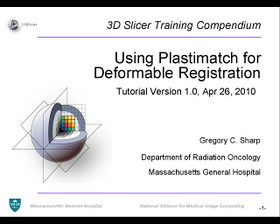Difference between revisions of "Modules:Plastimatch"
| (2 intermediate revisions by the same user not shown) | |||
| Line 2: | Line 2: | ||
__NOTOC__ | __NOTOC__ | ||
| − | ===Plastimatch=== | + | ===Plastimatch > B-spline Deformable Registartion=== |
{| | {| | ||
Latest revision as of 21:41, 14 February 2011
Home < Modules:PlastimatchReturn to Slicer 3.6 Documentation
Plastimatch > B-spline Deformable Registartion
General Information
Module Type & Category
Type: CLI
Category: Plastimatch
Authors, Collaborators & Contact
- Authors: See COPYRIGHT.TXT contained within the package
- Contact: Greg Sharp, Department of Radiation Oncology, Massachusetts General Hospital (gcsharp@partners.org)
- Web page: http://plastimatch.org
Module Description
This is the plastimatch automatic (B-spline) deformable image registration module. It includes a multi-stage, multi-resolution pipeline, as well as multicore and GPU acceleration. Compared to other B-spline methods in 3d slicer, the plastimatch registration method might offer:
- superior accuracy for CT-CT (or CT-CBCT) registration
- faster results for MSE registration
However, to date there have been no rigorous comparisons of the various 3D Slicer registration methods.
Examples of how this module is being used:
- Intra-subject registration for adaptive radiotherapy
- Inter-subject registration for automatic segmentation
Usage
Tutorials
Quick Tour of Features and Use
|
Development
Notes from the Developer(s)
Developer-oriented documentation is found on the plastimatch web site: http://plastimatch.org
Dependencies
This module has no dependencies.
Tests
Plastimatch features approximately 100 test cases.
Known bugs
Usability issues
Please report usability issues to the bug tracker.
Source code & documentation
We recommended to download the latest source code from subversion:
Documentation:
More Information
About plastimatch
Plastimatch is an open source software for deformable image registration. It is designed for high-performance volumetric registration of medical images, such as X-ray computed tomography (CT), magnetic resonance imaging (MRI), and positron emission tomography (PET). Software features include:
- B-spline method for deformable image registration (GPU and multicore accelerated)
- Demons method for deformable image registration (GPU accelerated)
- ITK-based algorithms for translation, rigid, affine, demons, and B-spline registration
- Pipelined, multi-stage registration framework with seamless conversion between most algorithms and transform types
- Landmark-based deformable registration using thin-plate splines for global registration
- Landmark-based deformable registration using radial basis functions for local corrections
- Broad support for 3D image file formats (using ITK), including Dicom, Nifti, NRRD, MetaImage, and Analyze
- Dicom and DicomRT import and export
- XiO import and export
- Plugins for 3D Slicer
Plastimatch also features two handy utilities which are not directly related to image registration:
- FDK cone-beam CT reconstruction (GPU and multicore accelerated)
- Digitally reconstructed radiograph (DRR) generation (GPU and multicore accelerated)
Acknowledgment
National Institutes of Health
NIH / NCI 6-PO1 CA 21239
Federal share of program income earned by MGH on C06CA059267
Progetto Rocca Foundation
A collaboration between MIT and Politecnico di Milano
References
- G Sharp, N Kandasamy, H Singh, M Folkert, "GPU-based streaming architectures for fast cone-beam CT image reconstruction and demons deformable registration," Physics in Medicine and Biology, 52(19), pp 5771-83, 2007.
- V Boldea, G Sharp, SB Jiang, D Sarrut, "4D-CT lung motion estimation with deformable registration: Quantification of motion nonlinearity and hysteresis," Medical Physics, 33(3), pp 1008-18, 2008.
- Z Wu, E Rietzel, V Boldea, D Sarrut, G Sharp, "Evaluation of deformable registration of patient lung 4DCT with sub-anatomical region segmentations," Medical Physics, 35(2), pp 775-81, 2008.
- G Sharp et al. "Plastimatch - An open source software suite for radiotherapy image processing," Proceedings of the XVIth International Conference on the use of Computers in Radiotherapy, May, 2010.




